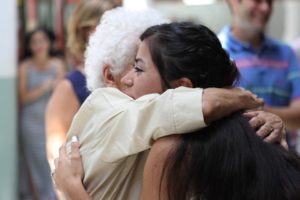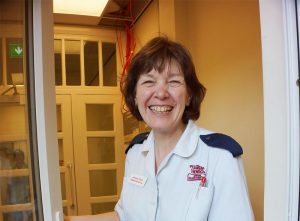 The agonising cost of no hugs in hospital is the title of an article by psychiatrist Max Pemberton, looking at the loss of human contact during Covid. (Daily Mail 15 March 2021). Hugs and touch are important ways that human beings communicate with each other. In his article Dr Pemberton tells of a confused elderly man in a dementia ward who was being helped by a nurse to video call his wife. ‘He couldn’t understand why she hadn’t come to see him and kept asking her if she still loved him and when he was going home. He started crying, his wife started crying and the nurse started crying.’ He added that there have been lots of sad incidents like this because of the virus, but that the alternative, to allow relatives to visit wards would put patients at risk, and would be far worse.
The agonising cost of no hugs in hospital is the title of an article by psychiatrist Max Pemberton, looking at the loss of human contact during Covid. (Daily Mail 15 March 2021). Hugs and touch are important ways that human beings communicate with each other. In his article Dr Pemberton tells of a confused elderly man in a dementia ward who was being helped by a nurse to video call his wife. ‘He couldn’t understand why she hadn’t come to see him and kept asking her if she still loved him and when he was going home. He started crying, his wife started crying and the nurse started crying.’ He added that there have been lots of sad incidents like this because of the virus, but that the alternative, to allow relatives to visit wards would put patients at risk, and would be far worse.
I like Dr Pemberton’s columns. (He’s also an advocate of cognitive behavioural therapy, which in my view confirms his expertise!) So I’m surprised that the newspaper he now writes for doesn’t seem influenced by what he says. It continually gets it wrong in its campaigning for older people. Earlier this year its front page carried a huge photograph of an older lady putting her hand through a fence to grasp the hand of a husband who had been wheeled up the other side by a carer. The headline shouted, ‘For God’s Sake Let Them Hold Hands!’ There was nothing that I could see in the article about the risk of the wife carrying the coronavirus which her husband would then take back into the care home, from where it would sweep through causing others’ deaths, as we saw last year when over 25,000 residents died after patients were discharged into them from hospital.
I’ve also been puzzled by the papers’ allegations that thousands of people in care homes have ‘succumbed to isolation and loneliness caused by cruel visiting restrictions aimed at stopping the virus from spreading.’ It is also said that “this has led to shocking deteriorations in the mental and physical health of care home residents, who rely on family visits to maintain their basic skills.’
This journalist simply has not only got his basic facts wrong, but has no idea of how care homes work. It is not family visitors that maintain resident’ basic skills: it is their carers. They do it minute by minute, day by day: they interact with them and talk to them, sing with them and make them smile. And homes’ activities coordinators’ bring fun and stimulation.
A care home manager recently told me, ‘It’s not just about people doing their jobs, it’s about relationships with the residents. Earlier today I heard our senior housekeeper singing one of the old favourite hymns with a resident as she cleaned her room. A lady with very bad dementia just loves singing with her.’ In this care home the maintenance manager turned a small lounge into a replica pub, and everyone was delighted with their pub meals that evening.
Thank God, deaths from Covid are falling sharply (see ONS stats), but there’s still the need for caution, for deep cleaning, and for careful visiting. Yet, even while welcoming the change as more relatives are allowed to visit, Fiona Carragher, the director of research and influencing at the Alzheimer’s Society said that care home residents with dementia, ‘who have been isolated from their loved ones without the essential care and support their families so often provide’ have ‘experienced a devastating increase in their dementia symptoms over the past year.’ That’s just not the way it is. People with dementia are in care homes in the first place because their families are not able to provide exactly this.
Recently, I’ve seen at first hand the decline of a dear older friend with vascular dementia. His wife and I believe that if they hadn’t been shielding and had had more interaction with others, it wouldn’t have happened so swiftly. David (name changed) is a ‘people person’, and carers like those in our care homes would have made the world of difference to him. People need people: a new study has shown that talking with someone with dementia who also suffers with depression can be more effective than drugs.
At the height of the pandemic, as the media focused on care homes, carers came under the spotlight and their skills and attributes were acknowledged. They were hailed as stars, as key workers, as vital to residents’ wellbeing. I hope the public remembers that better than those who are derogatory about care homes simply to publicize their own agenda.















